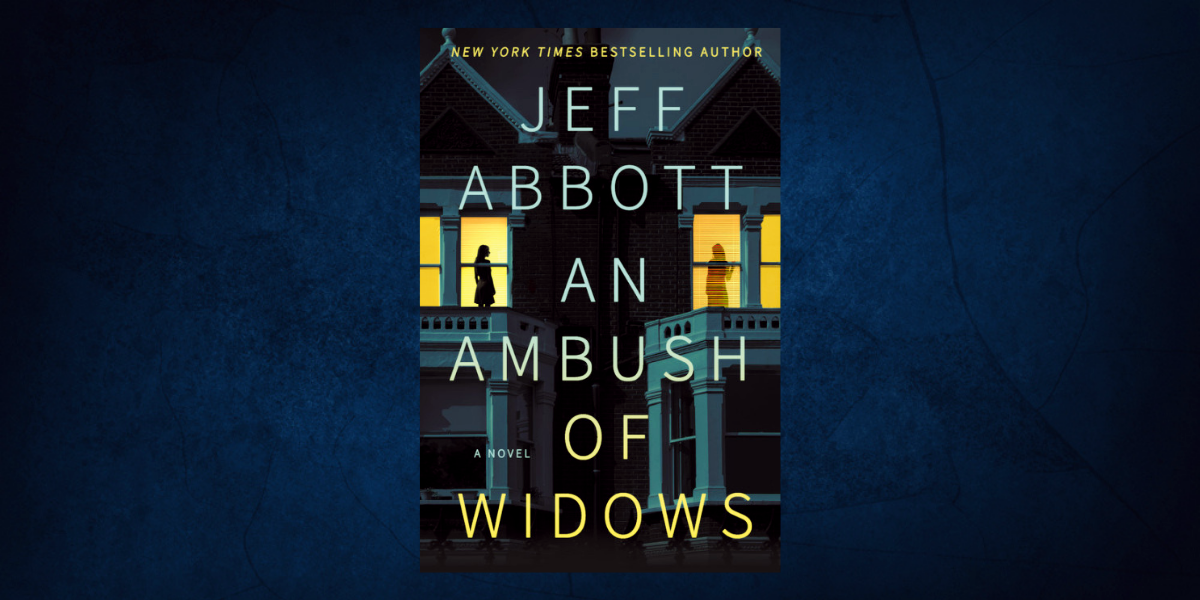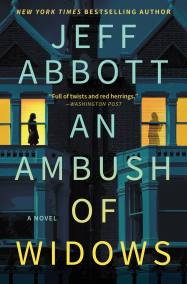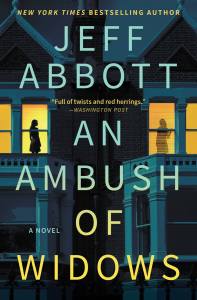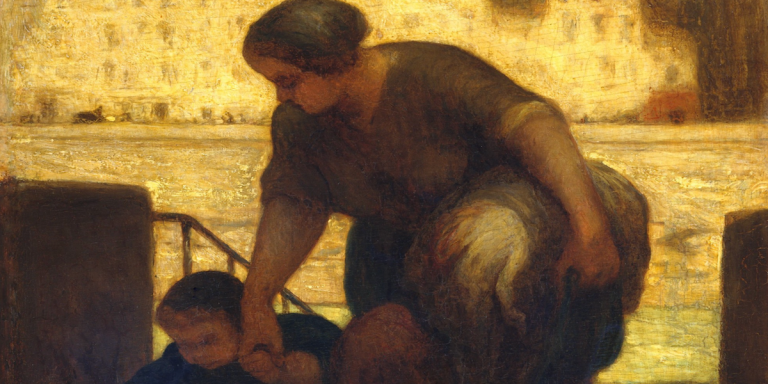Read the Excerpt: An Ambush of Widows by Jeff Abbott
1
THURSDAY EVENING
Kirsten North was doing what she normally did when Henry was gone on a business trip: finishing her own work on her laptop on the couch, ordering in Chinese food from that place Henry didn’t much like, and watching a British baking show that was like a televised tranquilizer.
She was on the second episode in her mini-binge when the phone rang. She glanced at the screen; it was Henry’s number.
“Finally, sweetie,” she said. “How’s New York?”
There was a silence for five seconds.
“Henry?” she said.
“Kirsten North?” The voice was muffled, indistinct, a whisper.
“Yes?”
“You’re Henry’s wife?”
A coldness fell on her skin like sudden rain. “Yes. Who is this?”
“Your husband has been killed. In Austin. Texas.” She couldn’t tell if the voice was male or female, and it didn’t matter, because it spoke madness.
“This isn’t funny, Henry,” she said, at the same time she thought that this wasn’t the kind of joke he would ever make. Henry’s phone must have been stolen and this was the sick thief’s idea of a prank.
“He was shot.” And then the caller hung up.
Kirsten North stared at the phone. Cruel and sick, that’s what
it was. Her husband was in New York, not Austin. She texted Henry: did u lose yr phone? Some sicko just called me from yr number. And then she realized the sicko was reading the text now because they’d called from Henry’s cell.
There was no replying text.
Think, she told herself. She pushed down the anger and the rising fear. What hotel had he told her he was staying at? She tried to remember while in the background one of the baking show judges gently chided a contestant for an undercooked crust, and the woman’s lip trembled like her whole world was falling in on her.
The Van Vleck, a small, quirky hotel not far from Times Square. Yes. He’d stayed there before on business.
She googled the hotel, called its main number.
The polite young man who answered checked and told her there was no Henry North registered there. She thanked him automatically and ended the call. But he arrived in New York Sunday night, and he’s due home tomorrow, she thought. He must have stayed at another hotel. She hurried through her emails and texts, in case she’d missed a message from him, telling herself when Henry called and explained he’d lost his phone she’d laugh at her silly worry.
He was shot.
Something in the voice . . . that awful voice. Like it was glad.
There was no mention of the New York hotel in his emails from last week.
Who was the client? What was the company name?
Henry had been trying hard to land clients beyond his few in New Orleans. Had he told her the name of his hotel and she hadn’t been listening? Sometimes she wasn’t a good listener.
She searched her emails and the texts from him once more. Nothing mentioning this New York client’s name.
Austin. She and Henry didn’t know anyone in Austin. They’d talked about moving there once, because it was growing so fast and there were lots of tech jobs, but Henry said there were so many freelancers it would be more competitive than New Orleans, which was just sort of emerging as a tech area and there were more chances here to make an impact. . . .
In Austin. He was shot.
Instead of looking for hotels in New York that sounded familiar, she entered in the search engine an awful phrase: “austin shooting.”
The results popped up, the most recent at the top. POLICE INVESTIGATE DOUBLE HOMICIDE. The related headlines: TWO MEN FOUND SHOT TO DEATH AT WAREHOUSE. LEADING BUSINESSMAN KILLED. The stories were tied to local news stations. The victims had been found two days ago, in the early hours of Tuesday morning.
He’d left early Sunday afternoon. “Got an early Monday morning meeting. I’ll text you,” he’d said. And he had, that all was fine, the meetings were going well. But if these headlines were about him, he was dead, and someone else had texted her from Henry’s phone. Nausea churned her gut; her chest felt tight. This couldn’t be.
She clicked on the first result and watched the news video. The reporter was young and eager and said two bodies had been discovered in the warehouse by a homeless person who had found an unlocked door and entered.
More details had emerged since Tuesday.
One of the men was named Adam Zhang. An entrepreneur of some note who had launched multiple start-up tech companies in the crowded Austin landscape. The other man had not been identified. Those active in the tech scene were expressing shock and dismay. “More to come,” the reporter said. The police were asking anyone who might have seen anything or knew anything to come forward.
If Henry was the other victim . . . why would an anonymous person call her? Why tell her this?
Had the call come from the murderer? Did the killer have Henry’s phone?
She started to shiver, her mind reeling in shock. She forced herself to take several deep breaths. No. Don’t just sit here. Do something. Be like Henry. Act when it seems impossible to act.
A back corner of her mind took over. She logged on to an airline website and found a late-night flight to Houston, connecting onward to Austin.
She could just make it if she hurried.
2
Nothing on this job had gone quite right; none of the normal protocols were followed, and now having his next target walking directly toward him in the airport was a sure sign to call off the hit.
Mender caught his breath. Here she was, hurrying toward a gate in the New Orleans airport, just as he’d come off his flight from Austin.
He stopped and looked at his phone and she rushed past him, her carry-on bag nearly hitting his hip.
Kirsten North was leaving town, just as he was arriving to take care of her.
His mind literally went blank; he nearly laughed. He normally felt emotionless about his work, but this job was testing his nerves. He followed her to the gate where she waited. The flight that he’d taken from Austin would soon be reboarding, getting ready to head back via Houston. He’d just come off the plane; if he tried to buy a ticket to get back on, wouldn’t that flag the system? Be suspicious? He could not be noticed.
Why was she flying to Austin?
Because she knew. How could she know?
He watched her, but he was careful to flicker his gaze because a woman could sense a stare. She was shivering. Anxious. Like she’d gotten bad news. But that wasn’t possible. Not yet.
He saw there wasn’t a change of crew. So if he got back on the plane, the flight attendants might notice him, might even jokingly comment.
He had no idea how to trace her once she made it to Austin. But this was a bonus-driven job and he had to risk it. He went back to the gate counter. Waited behind people trying to buy a lower boarding pass number. He put a beaten, sad look on his face.
“I just flew in on this arriving flight, but there’s a text. . . . ” Mender held up his phone like it had all the answers. “My dad’s had a heart attack in Austin; I need to fly back. . . . Can I get a ticket back on this flight?” His voice quavered.
The gate agent said, “I’m so sorry, let me check,” and Mender put on an expression of muted grief, one that wouldn’t draw attention. He glanced over toward the target. She was sitting, staring at her lap, not looking at anyone. Lost in real grief, where his was pretend.
“Yes, there’s a seat,” the agent said. Mender wordlessly shoved a credit card toward her. It didn’t have his real name on it.
“Thank you so much.”
“I hope your dad’s okay. You’ll be in the final boarding group, though. Sorry.”
“It’s fine.”
He didn’t have a checked bag—he was to get a weapon, courtesy of his handler, here in New Orleans. He dumped the weapon he’d used in Austin, per standard protocol. He got his boarding pass—a number so high it guaranteed a middle seat—and sat down, where he could see the target but she wouldn’t notice him.
It suddenly occurred to him that she would be in his boarding group; she must have been late in booking her flight as well. He hoped not. He did not want her to notice him. He had on a baseball cap and sunglasses; it was the best he could do to minimize being noticed or recognized.
The plane was readied; the groups lined up per the airline’s policy, with boarding group A first, numbers one through thirty.
The target and the killer both kept their seats.
“Group B,” the agent brightly announced, and more people rose. The plane, he guessed, might be full. It would be close. He should try to sit so he could deplane before her, so he could follow her when she left.
Then group C. The stragglers got up, worrying about whether there would be any remaining overhead storage; couples resigning themselves to not sitting together. The rest bracing themselves for the little hell of the middle seat.
They ordered themselves by number. The target was immediately ahead of him. Of course. She didn’t look back at him. They were the last two in line. He hoped she wouldn’t look at him.
They boarded the plane. The flight attendant gave them each a bright hello and neither the target nor he responded. The flight was nearly full. He scanned the seats, hoping she would pass up a middle seat toward the front of the plane and leave it for him so he could exit in Austin ahead of her and more easily follow her. But all the seats were taken.
He could see the last two seats, in the back row. Next to each other. A middle and an aisle, an older man already in the window seat with his neck pillow, reading a book.
The target glanced back at him and he froze. “You’re tall,” she said. “You can have the aisle.”
He found his voice and said, “You sure?”
She nodded. “It’s a short flight.”
“Thanks.” He glanced away as if embarrassed, but he didn’t want her looking at his face. Something had gone so bent on this job and he’d have to turn this to his advantage.
She had already turned away, shoving her carry-on into the overhead bin. He put his bag next to hers. She settled into the middle seat and he sat down in the aisle seat.
He had to decide how to do this. He could try to engage her in conversation, maybe in the Houston airport—they would have to change planes for Austin—then draw her somehow away from people and end her.
But if she was heading to Austin on a last-minute flight, she knew about her husband, and she wouldn’t be in any mood for some guy chatting her up, not with all the terrible thoughts that must be swirling in her head. He sat very still, looking ahead, sunglasses in place. She did the same.
He wondered: What is she thinking? He needed to just be the guy sitting next to her on the flight, faceless, voiceless. Unremarkable. He would not interact with her again; he would not give her reason to remember him.
The plan had been to make her look like a suicide. He couldn’t do that in an airport. Far too dangerous. Best to not be noticeable, to not engage.
How did she know?
He kept his gaze straight ahead. He heard the man in the window seat offer her a drink coupon when the flight attendant came around to take orders. She accepted.
The profile said she used to drink a lot but had stopped two years ago. She must be in shock right now. If she got drunk, maybe the hit would be easier when she got to Austin. Follow her to wherever she was going, pour more alcohol down the grieving widow, and then end her.
He smiled at the flight attendant and ordered a ginger ale.
3
Morgan cried and howled, as though he could feel Flora’s pain. She walked and patted the child, murmuring to him, wondering: Can a one-year-old know that his father is dead? Does he feel the shift in the world?
Flora Zhang had hardly slept since Adam and the unknown man were found shot to death. She had given Morgan an early dinner and then lay down on her and Adam’s bed with their son. She’d just drifted off, exhaustion taking its toll, when Morgan suddenly awoke, squalling, restless, and she stumbled to her feet, scooped him up, made her checks. Diaper dry, nose clear. She began her weary procession of walking back and forth.
The door to the nursery cracked open. Her next-door neighbor, Jeanne, stood in the doorway. “Flora? I can take him. . . . ”
“Thank you, Jeanne, I have him.”
“Are you sure?” Jeanne was in her sixties, silver hair fashionably cut short, bright blue eyes behind stylish red eyeglasses, always calm in a crisis. She had been a steadfast friend since Adam’s body had been found and Flora’s world unraveled. Jeanne had brought over the first meal in the initial shock, held Flora’s hand while she tried to process the impossible, been a constant, reassuring presence for Morgan.
“I have him,” Flora said and Jeanne nodded and shut the door. Jeanne meant well. But Flora couldn’t hand over her child right now. Adam was dead and Morgan was all she had left. She needed to hold her baby.
AmbushofWidows_HCtext3P 3 2021-04-20 16:16:38 8
But Morgan wouldn’t stop crying. Flora shuffled back and forth, trying every song he loved, the old lullabies, the ones Flora had heard Jeanne sing for him, fumbling over the lyrics because she wasn’t sure of them, and while his crying would subside it would not cease.
Adam. Sometimes he would stand in the doorway, watching her walk Morgan when he was fussy, as though the crying were an inconvenience and he was judging her job performance. Once when Morgan was asleep on her shoulder but she hadn’t wanted to set him down yet, Adam had said, “I know I’m not good at this dad stuff. I wish I could be.”
He had said that as though he’d forgotten himself, almost shyly, and then he’d taken Morgan from her and set him down in the crib and taken her back to bed. He had wanted a wife and a child and then once he had them, she sensed a growing indifference. As though he’d realized: Is this all there is to it? And she was in love with him, and she found herself wondering if he still loved her. She should have talked to him. Asked him.
And now the doorway was empty. It would always be empty.
Morgan kept crying, wriggling in her arms.
The door opened and for one moment she expected it was Adam, and the past two days had been an unmanageable dream. But it was Jeanne, again.
“Please, let me help you. I know you’re exhausted. . . .”
“I need Morgan to want me right now. To not cry . . . ” She managed to keep her voice under control. “Why doesn’t he want me? Is he sensing how I feel?”
“Oh, Flora. He’s just a bit fussy and out of sorts. Sweetie, you can’t help him if you’re exhausted. I’m here, let me help.”
And exhaustion won so she gave Morgan over to Jeanne. Who cooed and rubbed his back in a way different than Flora had, and his cries started to soften.
He responds to her more than me, Flora thought, and it was just another way for her to feel crushed. He can feel all my fear and my grief. It would be so much easier not to feel.
She eased the door shut and walked down the stairs to the
kitchen. She looked at the counter. More food. The neighbors, including Jeanne and her husband, Milo, just kept bringing food. Teddy Chao was on his laptop at the table, but as she came into the room, he put it aside and stood. That was one way you knew your life had forever changed; now people didn’t look at their phones or their tablets or their laptops if you were around. They looked at you.
“Morgan all right?” Teddy asked. He was young, early twenties, a little too handsome for his own good. Adam’s assistant strategist, protégé, and distant cousin. He had been living with them since he graduated from college two years ago.
“Yes. Jeanne seems to be able to calm him.” She tried to keep the bitterness out of her voice.
“Can I get you anything? Tea?”
She thought she had been offered more tea in the past two days than in her whole life. “No. What are you doing?”
“Dozens of people who work for the companies Adam helped launch have been emailing me about Adam. Offering condolences, support. I’ve been responding to them. I’ll keep all the emails for you to read if you like, when you feel up to it.”
“Thanks.” Maybe it would be comforting to read words of sympathy from people who knew him, who actually got to spend time with him. More time than they’d had together lately. She pushed that thought away. His business. She had hardly thought about it. “His company . . . I haven’t asked what everyone is doing.” Adam was gone, but the things he’d built, the lives he’d touched, remained.
“You don’t need to worry about it. Shawn and I have everything under control.” Shawn was Adam’s business partner in their venture capital firm, Zhang Townsend.
“All right. At some point, we have to talk about what happens next.”
“I think Shawn will want to buy out Adam’s partnership. He hasn’t said so, but . . . ”
Flora sat down and she realized that Morgan’s crying had stopped. He’d fallen asleep. For Jeanne, not for her.
“I’d like to stay on and work with Shawn,” Teddy said.
There was plenty of money, and she didn’t have to worry about that, but she had worked when Adam was in grad school, and she had worked as he built up Zhang Townsend from two guys with their desks pulled together to one of the largest venture funds in the South. She wasn’t so sure she wanted to sell her ownership shares. “We’ll see,” she said. Teddy nodded.
“The funeral . . . ,” Teddy began, as if hating the word. “We don’t know when the police will release the body. . . . Do you want to have a memorial service first?”
Flora rubbed at her temples. “I can’t decide right now.”
“All right,” Teddy said, in a tone that made it sound like it wasn’t all right. She didn’t care. Teddy was a lot like Adam, in that things needed to be done a certain way. Precise and proper and businesslike. But until she knew why he died, what had happened, it seemed bizarre to think about gathering with people and talking about him. It felt like rushing him into his grave.
Teddy said, “I didn’t mean to pressure you. I’m sorry.”
And of course he was just trying to help. Everyone was. But there was no help. Literally none. There were times in the marriage when she’d felt so alone, but this was a new kind of alone. She didn’t know what to do. The first two days had been numbness, her on autopilot, but now the reality was setting in that Adam was gone. And the rest of her life stretched out like a long, fogged road that she couldn’t see.
She glanced at the stairs as Jeanne came down them. “Morgan’s fine. . . . He cried it out.”
Flora started to say I’m glad he would sleep for you, but the words didn’t come.
“We were talking about the memorial service, Jeanne,” Teddy said. “That we’re going to wait.”
“Flora, can Milo and I do anything to help you with that?” Jeanne asked.
“No. I’m not ready to have an actual memorial like a church service yet. Maybe the fund-raiser on Saturday . . . maybe it could be like a way to honor him. A lot of people he knew will be there.”
“Yes, of course,” Jeanne said noncommittally. She glanced at Teddy. “I can stay over if you need me, Flora.”
“No, we’ll be fine,” she said. “Give my best to Milo and thank you again for everything.” She gave Jeanne a quick, grateful hug and Jeanne left, telling them she’d be glad to come over in the morning if they needed her and wishing them a good night.
“Do you still want to go to the fund-raiser? I know it mattered a lot to Adam, but . . . ” Teddy’s voice trailed off.
“All I want to know is why this happened.” Now she looked up at him. “Why . . . did this happen? Why is Adam gone; why does Morgan not have a dad? Why?” she repeated, and then she felt like a child for asking the question.
“I don’t know.”
“You knew . . . you knew the people he dealt with. Was there someone who could have wanted to hurt him?”
“No. Of course not. Everyone loved Adam.”
“Someone didn’t, Teddy. He was killed in an empty building he owned. He went there. To meet someone . . . a deal that went bad, someone resenting him . . .”
“No, I think this had to be some random . . . act, Flora. I know you want it to make some kind of sense, but it’s not going to. Someone might have spotted him near the warehouse, guy in a nice Mercedes, decided to rob him.” Teddy opened one of the casseroles and started to put food on plates.
Flora got up and went to the window. From their hilltop Lakehaven mansion that overlooked Lady Bird Lake, the lights of downtown Austin gleamed on the other side of the water, to the east.
She picked out the tower where he’d surprised her with the keys to a penthouse he’d bought three weeks ago. They had planned to move in two months. Or rather he had. She loved their Lakehaven home, having thoughtful neighbors like Jeanne and Milo, and the quiet. Lots of people lived downtown now, but there was traffic and honking horns and she had wondered how a baby would do, even in a penthouse. They wouldn’t have a yard. Adam thought she’d be delighted and she remembered her automatic smile feeling a bit frozen on her face. He couldn’t have even talked about it with her? What had he really thought of her, to assume she’d just accept a new home, sight unseen? Had he thought he knew her so well, when he didn’t at all?
The penthouse purchase meant that maybe she didn’t know him so well either. She didn’t like to ponder that thought.
“It won’t ever make sense to me,” she said.
“I’m not saying that. . . . I know the police will catch whoever did it. We have to have hope,” Teddy said.
Hope is a cruel thing, she thought.
Teddy brought her a plate with some chicken casserole on it, as well as salad and broccoli. “People have brought so much food, Flora, and you’ve got to eat.”
“I’m not hungry.”
“You didn’t eat lunch.”
“I’m not . . .”
“For Morgan. Do it for him. Please.”
Teddy was right. Flora sat down and ate dutifully. She barely tasted the food. She drank a glass of water Teddy brought her. Through the huge window she looked at the tower, where they were supposed to live. . . .
The penthouse light was on.
She was sure of it. Why . . . why would it be on?
No one was supposed to be there.
But someone was.
Why did this happen? Why? Maybe the answer was there, in the lit-up place he’d bought for her without even telling her.
She grabbed her purse off the table.
“Where are you going?” Teddy asked.
“I have to get out of here,” she said. “Just for a bit. Keep an eye on Morgan for me.” She decided not to tell Teddy she’d seen the light. He would call the condo management, ask questions. She wanted out of this house.
“Okay, I’ll drive you.” He stood. “I’ll get Jeanne to come back.”
“No. I want to be alone.” She’d felt stuck and mired for the past two days. She needed to do something. To not feel numb. To be in fresh air.
“Flora . . . ”
She shut the door on his words.
Order The Book
In New York Times bestselling author Jeff Abbott’s latest novel of riveting psychological suspense, an uneasy alliance forms as two widows delve into their husbands’ deadly and dangerous secrets—as they try to protect their own.
Henry North is a down-on-his-luck cybersecurity expert from New Orleans. Adam Zhang is the cofounder of one of Austin’s most successful venture capitalist firms. These two men didn’t know each other. They had never met. Yet they died together, violently, in a place neither had any business being.
When Henry doesn’t return from a business trip, his wife, Kirsten, panics—and then gets an anonymous phone call: “Your husband is dead in Austin.”
Flora Zhang knew her husband was keeping secrets. She suspected an affair, but she had decided she could forgive him for his weakness—until her husband ended up dead. And with no explanation for her husband’s murder, the police begin to suspect her.
Together, these two widows will face a powerful foe determined to write a false narrative about the murders. In doing so, neither Flora nor Kirsten will remain the women the world thought they were.
By clicking 'Sign Up,' I acknowledge that I have read and agree to Hachette Book Group’s Privacy Policy and Terms of Use








